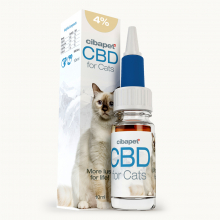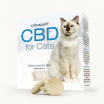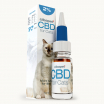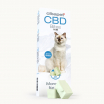Can Cats Absorb CBD Through Their Skin?
Published:
Cannabidiol (CBD) has become an increasingly popular supplement for both humans and pets in recent years. But can cats absorb CBD through their skin like humans can? As a cat owner, you may be curious if topical CBD products could help your feline companion in the same way that CBD oils and treats can.
Contents:
- How Does Transdermal CBD Work For Humans?
- Do Cats Have Cannabinoid Receptors In Their Skin?
- Potential Benefits of Topical CBD for Cats
- Are CBD Topicals Safe For Cats?
- Are CBD Oils and Topicals Equally Effective for Cats?
- Key Takeaways on Topical CBD for Cats
- Frequently Asked Questions About Topical CBD for Cats
- The Takeaway: Consult Your Vet About Topical CBD for Cats

In this comprehensive guide, we'll explore if transdermal CBD absorption is possible for cats and look at the potential benefits and risks of using CBD topicals on felines. By the end of this article, you'll understand if applying CBD balms, creams, and oils directly onto your cat's skin is an effective delivery method.
How Does Transdermal CBD Work For Humans?
First, let's look at how transdermal CBD works for human use. CBD topicals like balms, salves, lotions, and oils are formulated to be absorbed through the skin and interact with localized cannabinoid receptors.
When applied on the skin, CBD interacts with the endocannabinoid system (ECS) in the upper layers of the dermis. The ECS contains CB1 and CB2 receptors that receive and transmit signals from cannabinoids like CBD, regulating biological functions like pain, inflammation, and immune response.
Through transdermal absorption, CBD can reach the CB receptors in the skin without entering the bloodstream. This allows the CBD to take effect locally where it is applied.
Human skin absorbs CBD well because it contains an abundance of cannabinoid receptors and has a permeable structure that allows CBD to pass through the lipid layers easily.
This makes transdermal application an effective delivery method for humans to experience targeted CBD benefits. Topical CBD is popular for helping localized pain, skin conditions like acne and eczema, and surface-level muscle and joint tension.
Do Cats Have Cannabinoid Receptors In Their Skin?
Now that we understand how topical CBD works in people, the next question is - can the skin of cats absorb CBD in the same way?
To absorb CBD through their skin, cats need to have cannabinoid receptors present in the layers of their dermis. Without these CB receptors, the CBD molecules would not have anything to bind to, preventing absorption.
According to a 2007 study on the endocannabinoid system in domestic animals, cats do have CB receptors present in their skin and fur. However, the concentration of receptors found in feline skin is much lower compared to human skin.
There are a few key differences between human skin and feline skin that impact transdermal CBD absorption:
- Fur - The fur coat of cats creates a barrier that prevents direct contact between topicals and skin. Sebum from the fur can also dilute topical products.
- Thinner Epidermis - Cat skin has a thinner epidermis layer than human skin, with fewer cell layers for CBD to permeate through.
- Less CBD Receptors - Cats have comparatively fewer cannabinoid receptors in their skin that interact with CBD.
These differences make it more challenging for CBD topicals to reach the receptors and get absorbed through feline skin. But it still may be possible, just at lower efficiency.
Potential Benefits of Topical CBD for Cats
While the research is still limited, some evidence suggests transdermal CBD could potentially have localized benefits for cats. Here are a few of the topical CBD applications being explored for feline use:
Surface Pain Relief - For cats suffering from aches and pains on skin-level areas, like joint discomfort or injuries, topical CBD applied on the source may help provide localized comfort by interacting with cannabinoid receptors. Always consult your vet first.
Skin Irritations - Soothe various types of skin irritation in cats, like itchiness, bug bites, and inflammation. The antimicrobial and antioxidant properties of CBD may calm the skin when applied topically.
Aging Pets - CBD may revitalize dry or itchy skin caused by aging when used topically. Senior cats with thinning fur coats may also absorb more CBD through their skin as a delivery method.
Anxiety - Some limited findings indicate that topical CBD may help calm anxious behaviors in cats when applied around the facial region by interacting with receptors near tactile nerves. More research is still needed.
These potential topical applications are supported primarily by anecdotal evidence and reports from pet owners and vets. Much more research is needed to fully verify transdermal CBD benefits for cats. But some cat owners do choose to try topical CBD under veterinary guidance.
Are CBD Topicals Safe For Cats?
While transdermal CBD shows promise for cats, pet owners also need to be aware of the potential risks of using these products on felines. Here are some safety considerations:
- Licking - Cats are infamous self-groomers. Licking off applied CBD could cause your cat to ingest too much. Avoid areas they can reach with their mouth.
- Incorrect Dosage - It's harder to control CBD dosage with topicals. Absorption efficiency can vary between applications.
- Skin Irritation - CBD topicals may cause skin irritation, rashes, or inflammation if your cat has sensitivities to an ingredient. Always do an allergy test first.
- Lack of Research - There have not been sufficient clinical studies on CBD for cats to fully confirm safety. Use caution and work closely with your vet.
To use topical CBD with cats, consult your veterinarian first about the specific product and application plan. Only purchase high-quality CBD formulated for pets from trusted brands that provide lab testing. And monitor your cat closely when first using to watch for any adverse reactions.
Are CBD Oils and Topicals Equally Effective for Cats?
At this point, you may be wondering whether it's better to use traditional CBD oils and treats or experiment with topical products for your feline. Here is a quick comparison of the two delivery methods:
CBD Oils & Treats
- Easily absorbed into the bloodstream when given orally
- Provides overall, full-body effects
- Dosage is easier to control
- More research exists on safety
CBD Topicals
- Applied directly to the skin surface
- Provides only localized effects
- It's uncertain how much is being absorbed
- Very little feline-specific research exists
Most evidence indicates that CBD is absorbed more effectively in cats when administered orally through oils, treats, or capsules. These products have undergone more rigorous testing for safety and allow CBD to enter the bloodstream rapidly to interact with endocannabinoid receptors throughout the body.
Topical CBD, on the other hand, has more variable absorption and has not been studied extensively on cats. However, some owners may want to try them under the guidance of a vet for potential localized benefits. At this time, there is no research showing transdermal CBD to be either safer or more effective for cats compared to traditional oral administration methods.
Key Takeaways on Topical CBD for Cats
Here are the key conclusions from our guide on transdermal CBD use for cats:
- Cats have cannabinoid receptors in their skin and fur that could potentially interact with topically applied CBD, but at lower concentrations than humans.
- The absorption efficiency of CBD through a cat's skin is reduced due to their fur coat, thinner epidermis, and fewer CB receptors compared to human skin.
- Some possible localized benefits may include soothing skin irritations, joint discomfort, anxiety, and aging ailments when applied topically. More research is still needed.
- CBD topicals could cause side effects in cats if they ingest it while self-grooming. Always consult a veterinarian first.
- Oral CBD oils and treats are shown to be more reliably absorbed compared to topicals. But some owners may try using topicals under medical guidance for a localized effect.
While transdermal CBD shows some potential for cats, the research is in its early stages. Work closely with your vet to determine if topical CBD could be right for your feline companion among the safer oral CBD options that exist. As more clinical trials emerge, we will better understand the viability of CBD topicals to help our furry friends.
Frequently Asked Questions About Topical CBD for Cats
Question: Can I apply human CBD topicals on my cat?
Answer: No, you should never use any CBD products formulated for humans on cats. CBD products for pets contain different ingredients and concentrations tailored specifically for the physiology of cats and dogs. Using improper dosages and untested ingredients puts your cat's health at risk. Always choose CBD products designed just for cats. Consult your vet first.
Question: What parts of a cat's skin absorb CBD best?
Answer: Areas with the least fur coverage and are closest to the CB receptors tend to have better absorption. This includes the paws, around the nose and mouth, the tips of the ears, and sections of the belly. But absorption efficiency will vary individually between cats.
Question: How long does it take for topical CBD to work in cats?
Answer: It typically takes 15-30 minutes after application to notice initial effects from transdermal CBD in cats. However, the full results are usually not seen for 1-2 hours. Monitor your cat carefully in the hours after first applying a CBD topical and watch for desired benefits or any negative reactions.
Question: Can CBD topicals be used on cats long-term?
Answer: There is no research yet on the long-term use of topical CBD for cats. Most evidence suggests oral CBD is safer for long-term use in cats, while topicals may be better for short-term targeted applications. Discuss with your vet about what's appropriate for your individual cat.
Question: Are CBD topicals guaranteed to work on cats?
Answer: No, while they show potential, there are no guarantees that a topical CBD product will work or be absorbed effectively for your specific cat. The research is still very limited. Success can vary based on your cat’s unique physiology. Work closely with your veterinarian when trying topical CBD on your cat and monitor them closely.
The Takeaway: Consult Your Vet About Topical CBD for Cats
While more studies still need to be done, there is potential for cats to absorb CBD through the skin and experience some localized benefits when applied topically. However, absorption is likely minimal and the effects are constrained compared to traditional CBD oils and treats.
Due to the many uncertainties and risks, veterinary guidance is essential when using any CBD product on your cat. Have an open discussion with your vet about whether trying topical CBD is appropriate based on your cat's health history and needs. Together you can determine if a topical CBD trial may be worthwhile or if an oral CBD product is the safer choice.
With your vet overseeing the process, some cat owners may want to cautiously experiment with a high quality, veterinarian-approved topical CBD under controlled conditions to see if any positive results are noticed. But extended use of transdermal CBD for cats is not recommended until more clinical evidence emerges.
While an exciting prospect, the verdict is still out. More research is needed to confirm if cats can truly absorb and benefit from cannabidiol applied through their skin like humans can. But by working step-by-step with your trusted veterinarian, some pet owners may find topical CBD worth an initial try for giving their felines a little extra comfort.
What is CBD?
CBD stands for cannabidiol, which is a chemical compound found in the cannabis plant. Unlike THC, another compound in cannabis, CBD is not psychoactive and does not produce a “high”. CBD has become popular for its potential therapeutic benefits.
How is CBD administered to cats?
The most common ways to give CBD to cats are orally through oils, treats, or capsules, or through a topical product applied to the skin. CBD is fat-soluble, so oral administration via oil allows proper absorption.
Can cats absorb CBD through their skin?
Yes, there is evidence that cats have cannabinoid receptors in their skin and fur that allow for absorption and interaction with CBD when applied topically. However, a cat's skin is not as permeable as human skin, so absorption rates are lower. The fur coat also acts as a barrier.
Why would you use a topical CBD product on a cat?
Potential reasons to use a topical CBD product on cats include:
- Targeted relief for skin irritations, itchiness, burns, or inflammations
- Arthritis and joint pain relief by applying to affected areas
- Anti-anxiety benefits from application around the head and facial nerves
- Skin revitalization for aging cats
Are topical CBD products safe for cats?
More research is still needed, but topical CBD is generally well-tolerated in cats at appropriate doses. However, there are some risks to consider:
- Cats may lick off applied product and ingest too much
- Absorption rates are hard to control and measure
- CBD could potentially irritate sensitive skin
- Lack of specific studies on cat skin absorption
What should I look for in a topical CBD product for cats?
If choosing to use a topical CBD product for your cat, only select high-quality products designed specifically for pets. Look for:
- Formulas created just for cats, not humans
- Confirmation of 3rd party lab testing
- Reviews from other cat owners
- Approval of use from your veterinarian
- Organic ingredients
- Precise CBD dosing guidelines
How should I apply and use topical CBD for my cat?
Follow these tips for proper topical CBD use:
- Carefully follow label dosage guidelines
- Apply on hard to reach spots your cat can't lick
- Spread thinly and evenly over area
- Allow product to dry before petting or contact
- Observe for any skin reactions
- Limit applications to 1-2 times daily
Is topical or oral CBD better for cats?
Most evidence points to oral CBD oils and treats being more reliably absorbed in cats compared to topicals. But under veterinary guidance, some owners have success using topical CBD for localized benefits. Discuss with your vet.
Are there potential drug interactions?
Yes, CBD can potentially interact with some medications like anti-anxiety drugs and steroids. Always consult your vet before using any CBD product with your cat.


















